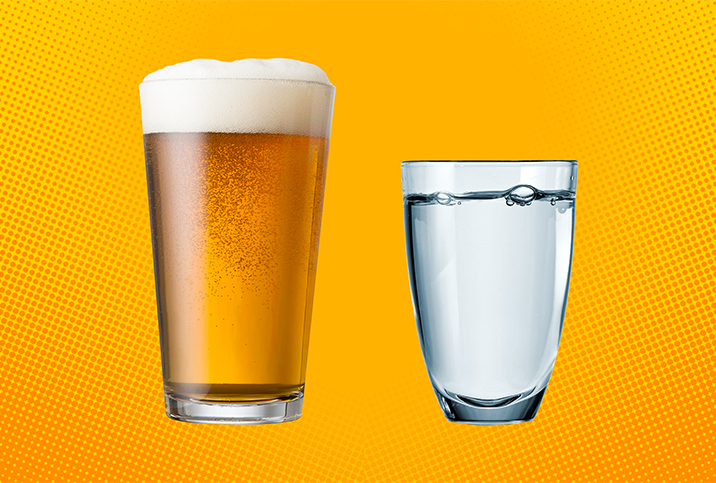Pink Cloud Syndrome: The Elation of Early Sobriety

Kicking drugs or alcohol can be an arduous process. Deciding to stop—and committing to that decision—is difficult enough. Then the symptoms of withdrawal come: everything from insomnia and anxiety to shakes, fever and hallucinations, depending on the individual and the substance. Making it past this beginning stage can elicit feelings of relief, triumph, elation and euphoria, a phenomenon known as the "pink cloud" or "pink cloud syndrome."
"[The pink cloud] is when a person who has abused alcohol or drugs starts to feel like they have made a significant milestone in overcoming their addiction," said Beau Nelson, D.B.H., L.C.S.W., the chief clinical officer of FHE Health in Miami. "It is a time of euphoria and confidence and believing they will never use again because they feel so excellent."
The pink cloud usually appears in the early stages of sobriety between days 14 and 45, although it can arise much later. This honeymoon phase can inspire and incentivize a person to continue working on recovery. It can also impede progress by creating false expectations and an exaggerated sense of confidence.
"For the most part, pink cloud syndrome is unhelpful for addicts because they think they have kicked their problem when this is just the beginning," Nelson explained. "People think that just because they've gotten over the worst of the physical withdrawals and have met a milestone in dealing with their alcohol or substance use, everything will be easy going forward."
This honeymoon phase can inspire and incentivize a person to continue working on recovery. It can also impede progress by creating false expectations and an exaggerated sense of confidence.
He said there's no set time frame for how long the pink cloud persists—ranging from days to weeks or months—and it isn't always a one-off occurrence.
"When it dissipates, people are often depressed and feel disheartened at the prospect of recovery and what it requires," Nelson said.
"When they experience sadness or anger or other negative emotions during recovery, this can make it more likely that they will relapse," said Thomas Jameson, a licensed therapist and the clinical director of the Ohana Addiction Treatment Center in Hawaii. "Pink cloud syndrome creates false expectations for recovery."
Signs and symptoms
If you've recently recovered from withdrawal and feel generally elated and overwhelmingly positive about your sobriety, you're probably "pink clouding."
"Generally, people feel very good during this time, they are even euphoric, and they are convinced that they have handled their problem," Nelson said. "We hear them say things like 'I will never drink again,' 'I will never use again,' 'I will never be as bad as I got before' and 'I have this taken care of.' Some people feel so good that they become out of touch with reality and don't realize the journey that's necessary to face the causes of substance use. They are naïve about how they need to proceed to maintain their sobriety."
Nelson and Jameson said pink cloud symptoms vary from one person to another but can include:
- Feelings of elation or euphoria
- Heightened optimism and positivity regarding sobriety
- High energy levels
- Increased eagerness and motivation to do everyday tasks
- Feelings of confidence and invincibility
- Overlooking the challenging aspects of maintaining sobriety
- Tendency for risk-taking
- Increased interest and engagement in recovery-related activities and healthy lifestyle choices
Why it's good and why it's not
Substance use and addiction can substantially impact a person's life, including mental and physical health, self-confidence and relationships. They can also cause emotional numbness and diminish motivation. The security and optimism people feel in the pink cloud phase can reinvigorate their desire to engage with life, mend fences and invest fully in recovery and personal development. Sometimes the pink cloud provides hope after years of depression.
However, the bright side has an equally dark counterpart. If a person has unrealistic expectations of recovery or believes their work is done, they may forgo further help or "think things do not work when they crash," Nelson said.
"For many, when they start to face challenges again in their life or the causes that may have led to excessive alcohol or drug use, they will feel disheartened, and this could lead to relapse," Nelson explained.
Some people experience post-acute withdrawal syndrome (PAWS), a secondary, protracted withdrawal phase when the pink cloud dissipates. According to American Addiction Centers, PAWS symptoms are primarily psychological and emotional and include:
- Depression
- Anxiety
- Sleep difficulties
- Memory problems
- Difficulty concentrating or thinking clearly
- Irritability
- Mood swings
- Low energy or fatigue
- Low libido
- Unexplained chronic pain
There is no definite, singular cause of PAWS. However, according to American Addiction Centers, experts theorize it could result from a homeostatic adjustment in the brain, physiological adaptations, stress or habit changes linked to substance use and lack thereof.
How to prepare and cope
It's usually easier to confront adversity when you're in a positive state of mind. The pink cloud phase is an opportune time to learn more about what lies ahead on the road to recovery, including the work involved in maintaining sobriety. It's also a good time to identify your triggers and the high-risk situations you need to avoid.
Professional treatment is essential because it equips you with the knowledge and tools needed to set and achieve goals, and cope with various challenges. A professional can help you identify and address the root causes of your substance use and offer an objective, realistic perspective.
Having a support network is equally important. In addition to programs such as Alcoholics Anonymous (AA) and local support groups, leaning on loved ones and tapping into online communities can prove fruitful, too, providing social and emotional reinforcements in the short and long term.
Self-care is crucial, too. When misusing drugs or alcohol, people often prioritize the substance while neglecting themselves and their relationships. While in recovery, it is necessary to invest in a holistic self-care regimen that nourishes the body, mind and spirit, including elements such as:
- Getting eight to nine hours of sleep a night
- Maintaining a healthy diet
- Drinking plenty of water
- Exercising regularly
- Spending quality time with loved ones
- Maintaining or resuming hobbies
- Learning and practicing relaxation techniques
- Becoming attune to your body and emotions
- Setting achievable goals for self-development
- Taking time to rest and recharge
To effectively harness and prolong the pink cloud's beneficial aspects, Nelson recommended committing the positive feelings to memory intentionally, recognizing personal growth and resilience, and expressing gratitude for the gifts of recovery.


















